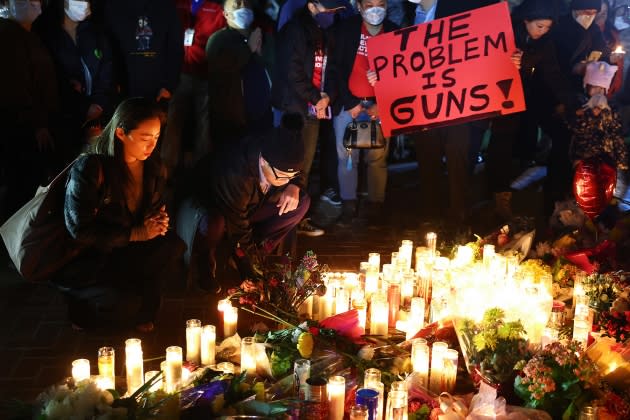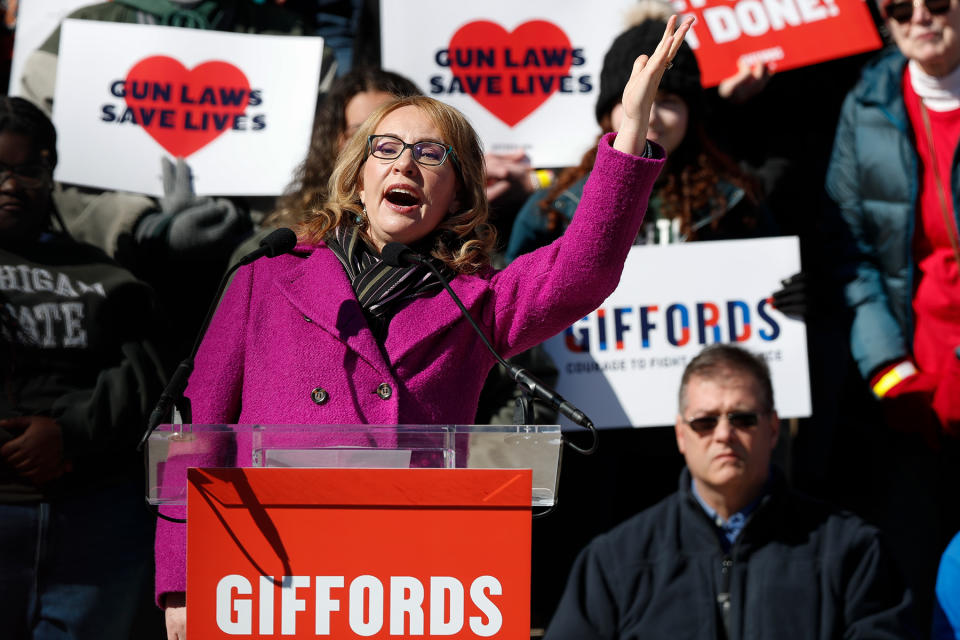Gabby Giffords: Cynicism Is Not an Option When It Comes to Gun Safety
- Oops!Something went wrong.Please try again later.
- Oops!Something went wrong.Please try again later.

There’s a self-defeating argument I’ve often heard used to explain the state of gun violence in this country. It goes something like this: If we couldn’t change things after 20 first-graders were murdered at Sandy Hook, what hope is there now?
I understand the impulse to give in to cynicism and despair. I also don’t think it serves anyone to ignore the facts. It’s true that gun violence has reached epidemic proportions. In 2021, nearly 50,000 Americans died from gun violence, and tens of thousands more were injured and will have to live with that pain and trauma for the rest of their lives. Gun violence is now the leading cause of death for children. In recent months, we’ve experienced a devastating spate of shootings of young people who knocked on the wrong door, pulled into the wrong driveway, or tried to get into the wrong car.
More from Rolling Stone
Just over the past few weeks, we’ve seen mass shootings in Cleveland and Allen, Texas. The latter happened during a normal Saturday afternoon, with people losing their lives while shopping and running errands. We have had more mass shootings than days in the year already in 2023. Texas lawmakers have failed to act; they haven’t passed a single piece of gun-safety legislation in the aftermath of the school shooting at Robb Elementary in Uvalde.
Related
Rolling Stone Teams Up with Everytown for Gun Safety to Release Special Edition T-Shirt
Margo Price on Gun Violence, Protests, and Privilege
18-Year-Old Confesses to Fatally Shooting Pop Smoke
But cynicism and despair run contrary to my nature. When I was a girl, I played the title role in the musical Annie, and felt like the part was tailor-made for me. I’ve always been optimistic, to an almost relentless extent, and boy, has that come in handy over the past 12 years.
In 2011, I was shot in the head while meeting with constituents in Tucson, Arizona. I was born and raised in Tucson, and I still live there today. It felt like a particularly cruel twist of fate that this violent attack happened in my hometown, while I was embracing the commitment to public service that has always been so central to my life.
Six people were killed on that January day, including one of my staffers and a nine-year-old girl. She’d come to my “Congress on Your Corner” event to learn about the importance of civic participation in democracy. The country got an entirely different lesson in democracy that day, about what could happen when differences in political opinion were expressed not through voting but through violence.
A number of news outlets mistakenly reported that I had been killed. For days, I was in a medically induced coma with my husband, now-Sen. Mark Kelly, by my side. When I opened my eyes, I did so in a new reality. The bullet that tore through my brain left me partially paralyzed and with the communication disorder aphasia. I had to relearn how to walk and talk. To this day, I work with my speech therapist twice a week so that I can continue to make progress in my recovery journey.
After returning to the House floor for a pivotal vote on raising the debt ceiling in August 2011, I made the difficult decision to step down from Congress on Jan. 25, 2012. I was focused on making progress in my own recovery journey until Dec. 11, 2012, changed everything once again. After the horrific tragedy at Sandy Hook Elementary, I told my husband Mark “enough.” On the second anniversary of my shooting, weeks after the shooting in Newtown, we launched the organization today known as GIFFORDS.

We wanted GIFFORDS to bring Americans across the political spectrum together to strengthen our nation’s gun laws and stand up for gun safety. In Congress, I prided myself on being a moderate Democrat, one of the “Blue Dogs.” It was always important to me to get bipartisan support on every piece of legislation I introduced.
This year marks the 10-year anniversary of the founding of GIFFORDS. Over the past decade, I’ve had the opportunity to work alongside so many different kinds of people in the fight for gun safety: responsible gun owners, students, fellow survivors, veterans, doctors, legislators at all levels of government.
The gun lobby has done its best to divide our nation and to polarize the conversation around guns. They want their base to believe that their Second Amendment rights are under attack, and that threats are lurking around every corner. This extremism drives votes and sells guns.
Rather than relying on extremism, I’ve sought to find common ground. Most Americans agree that gun violence is a problem we need to address. No American wants to worry that their child might not come home from school because of a mass shooting. Policies like closing loopholes in our federal background-checks system, making sure every state has an extreme risk protection order or “red flag” law, and ensuring guns are kept away from kids have broad popular support.
There are countless survivors and advocates who have been in this fight longer than I have whose names you will never know. Countless more who lost their lives to this crisis, lives that we seek to honor with action every single day. And thanks to the courage, persistence, and optimism of this incredible group of people, we have made important progress in this fight.
In the 10 years since the Sandy Hook shooting, our movement has passed more than 500 gun-safety laws in states around the country. These laws have helped keep guns away from domestic abusers, funded lifesaving community violence intervention programs, and regulated untraceable ghost guns. And they save lives: Year after year, our Gun Law Scorecard finds that states with stronger gun laws have lower gun-death rates.
Last summer, our movement did something that many people swore was impossible: We passed gun violence prevention legislation through Congress. The Bipartisan Safer Communities Act, the first piece of federal gun safety legislation in nearly 30 years, strengthened background checks for gun purchasers under 21, funded violence intervention programs, and closed the “boyfriend loophole.”
In the past year, we also launched the GIFFORDS Center for Violence Intervention. Most firearm homicides and nonfatal shootings happen not in the context of high-profile mass shootings, but in underserved communities of color. Our Center for Violence Intervention team uplifts the transformative work of the community organizations and strategies that break cycles of gun violence. This June, we’re hosting our first annual Community Violence Intervention conference in Los Angeles, an opportunity for people committed to saving lives from community violence to come together, share best practices, and advocate for change.
There are undoubtedly still obstacles in our path. Even as the tragedy of mass shootings dominates the news cycle every few weeks, the gun lobby continues to push dangerous laws like permitless carry, which allow anyone to carry a concealed gun in public without passing a background check or undergoing safety training.
When I get discouraged, that’s when I fall back on the gritty optimism that has gotten me through many tough times. A few years ago, I had the pleasure of opening my home to Betsy West and Julie Cohen, the extraordinarily talented filmmakers behind the documentary RBG. They made a documentary about my recovery journey and activism titled Gabby Giffords Won’t Back Down that premiered this past summer.
The title is a nod to Tom Petty’s “I Won’t Back Down,” one of my favorite songs, which is also featured in the film. Music has been such an important part of my recovery — I’m relearning how to play the French Horn and love to sing, which sometimes comes more easily than speaking. I like to think of “I Won’t Back Down” as my anthem when things get tough, both in my personal recovery and in our collective fight for a safer future.
It’s true that we’re not where we want or need to be in the fight against gun violence. It’s also true that throwing up our hands and admitting defeat will send us backward, not forward. I’m grateful for the hard-won victories we’ve achieved together over these past 10 years, and I’m even more grateful for the courage of every single person who devoted time and energy to achieving them.
We have a long way to go, but we won’t back down.
Buy the Special Edition Everytown Wear Orange Tee on the Rolling Stone Shop
Our special edition Everytown Wear Orange T-shirt, designed to honor the lives impacted by gun violence, is available on the Rolling Stone shop. Rolling Stone will make a donation to Everytown for Gun Safety Support Fund to support their efforts to end gun violence.
Best of Rolling Stone

